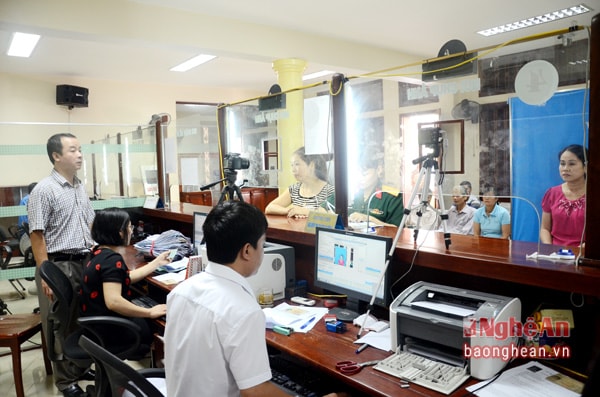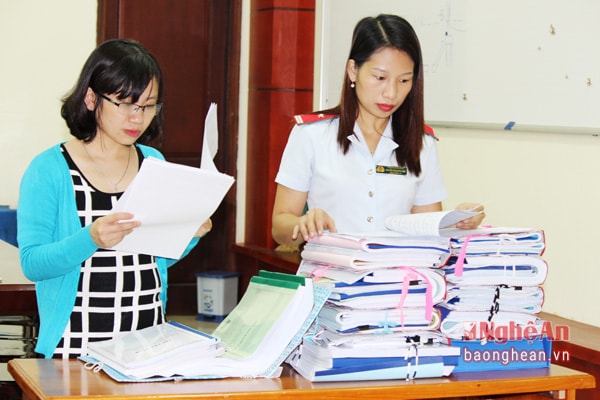Administrative reform in departments and branches: Many limitations remain
(Baonghean) - Although there have been many positive changes, administrative reform work in departments and branches still has limitations. Some areas of administrative procedures are not really streamlined, the quality and sense of responsibility of some officials and civil servants are not really close to the people, close to the people and serving the people.
 |
| Resolving administrative procedures for people at the One-Stop Department of the Department of Transport. |
Strong transformation
Present at the Nam Dan Road Vehicle Testing Center on a test day, we recorded a very serious and urgent working atmosphere. Many people seemed comfortable while waiting to receive their driving licenses.
Mr. Nguyen Van Ngoc (48 years old, Thanh Chuong district) happily said: "I have just passed the car driving test, now I only need to wait 1 or 2 hours to get my license. It is very convenient, unlike before, I had to wait a week or even a month to get my license; it was time-consuming and traveling was also difficult."
Like Mr. Ngoc, many people waiting to get their licenses after taking the exam here also expressed their satisfaction with the new way of doing things of the Department of Transport. That is one of the measures showing the efforts in administrative reform of this unit in recent times.
According to the assessment of the Ministry of Transport, Nghe An Department of Transport is the first unit in the country to apply this new method, aiming to create maximum favorable conditions for candidates after passing the exam.
In addition, the Department of Transport has built and put into use Mobil Work road infrastructure management software to serve the management and maintenance of traffic infrastructure assets.
This continues to be the first software built in the country to be highly appreciated by the Ministry of Transport and has been studied and applied by many Departments of Transport of provinces and cities.
Not only in the field of transportation, but administrative reform innovation is also carried out in all sectors, contributing to the economic development of Nghe An to achieve many positive results.
A typical example is a series of positive changes at the Department of Construction - one of the units directly handling procedures and documents related to investment projects in the area.
According to the assessment of the Inter-sectoral Inspection Team inspecting the administrative procedure control work at the Department of Construction at the end of October 2016, the processing time of documents in the fields of construction, planning and housing has been shortened compared to the regulations. Thanks to that, the cumbersome, overlapping and rigidity in the document issue has been avoided, creating a legal environment for economic sectors and investors in Nghe An province to feel secure in doing business and developing.
Similarly, positive changes have also been implemented at the Department of Natural Resources and Environment – the sector primarily responsible for handling administrative procedures related to land, minerals, environment, and water resources.
Currently, the Department of Natural Resources and Environment is deploying the HCM eGov Framework 2.0 system and implementing the project of applying information technology to issue land use right certificates through level 3 online public services. These efforts are creating an open mechanism, meeting the need to quickly and conveniently resolve administrative procedures for people and businesses.
Overcome passivity and confusion
 |
| The Interdisciplinary Inspection Team conducts administrative procedure inspection at the Department of Construction. |
Administrative reform is a regular and long-term task. Although there have been many positive changes, administrative reform work in departments and branches still has limitations. Some areas of administrative procedures are not really streamlined, the quality and sense of responsibility of some officials and civil servants are not really close to the people, close to the people and serving the people.
As at the Department of Natural Resources and Environment, some administrative procedures under the jurisdiction of the People's Committees at district and commune levels have not been promptly announced by the Department. In addition, some documents in the fields of minerals, prices, and land are still behind schedule compared to regulations.
Explaining the delay in these issues, Mr. Thai Van Nong - Deputy Director of the Department said: "Regarding the consultation on the announcement of administrative procedures under the authority of district and commune levels, the Department admits that there has not been a synchronous implementation. The files are being processed slowly because they have to ask for opinions from relevant sectors or the files need to be supplemented, or are stuck with legal regulations that require opinions from central agencies."
Thus, although attention has been paid to the review of administrative procedures and their implementation in many areas, there is still a passive and confused attitude; leading to a lack of responsiveness in implementation, causing delays in the processing of records.
In addition, this passivity also affects the officers who handle administrative procedures. For example, at the Nghe An Tax Department, the task of controlling administrative procedures has been assigned to the focal officers, but the Department has not yet implemented the level of support for the focal officers to perform this task.
Therefore, more than anyone else, the leader in implementing administrative reform must uphold the spirit of responsibility, proactively enhance coordination between agencies, units, and localities; between specialized departments and between administrative agencies at all levels and central agencies located in the locality to achieve the best results.
This is the weakest link for administrative reform to have stronger changes, creating synchronous and effective development.
However, the initiative must also be carried out in accordance with the general procedures and regulations to avoid errors. For example, at the Department of Transport, the unit's leaders have paid attention to the review of administrative procedures such as establishing a review team for administrative procedures and directing relevant departments and offices to be responsible for reviewing administrative procedures under their management authority.
However, this work was carried out before the decision was announced by the Chairman of the Provincial People's Committee, causing the steps to be carried out in a "reverse process".
Mr. Pham Thanh Chung - Deputy Director of the Department of Justice, Head of the Interdisciplinary Inspection Team inspecting the control of administrative procedures, assessed: "In general, the control of administrative procedures has been implemented quite thoroughly and resolutely by departments and branches.
However, it is not really synchronized, when encountering problems in the process of handling documents, they are not proactive in finding solutions. Therefore, administrative reform has not achieved absolute satisfaction for people and businesses.
In 2015, Nghe An's administrative reform index was 86.80%, ranking 21st and in group B of provinces and cities nationwide. Regarding the provincial competitiveness index (PCI), Nghe An ranked 32nd, down 4 places compared to 2014.
Phuong Thao



